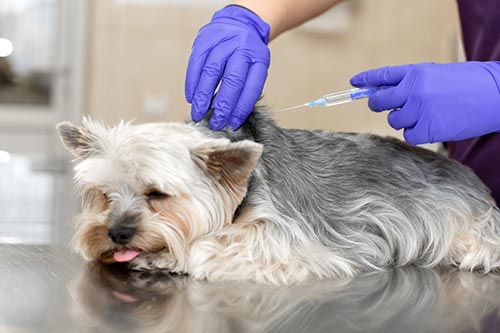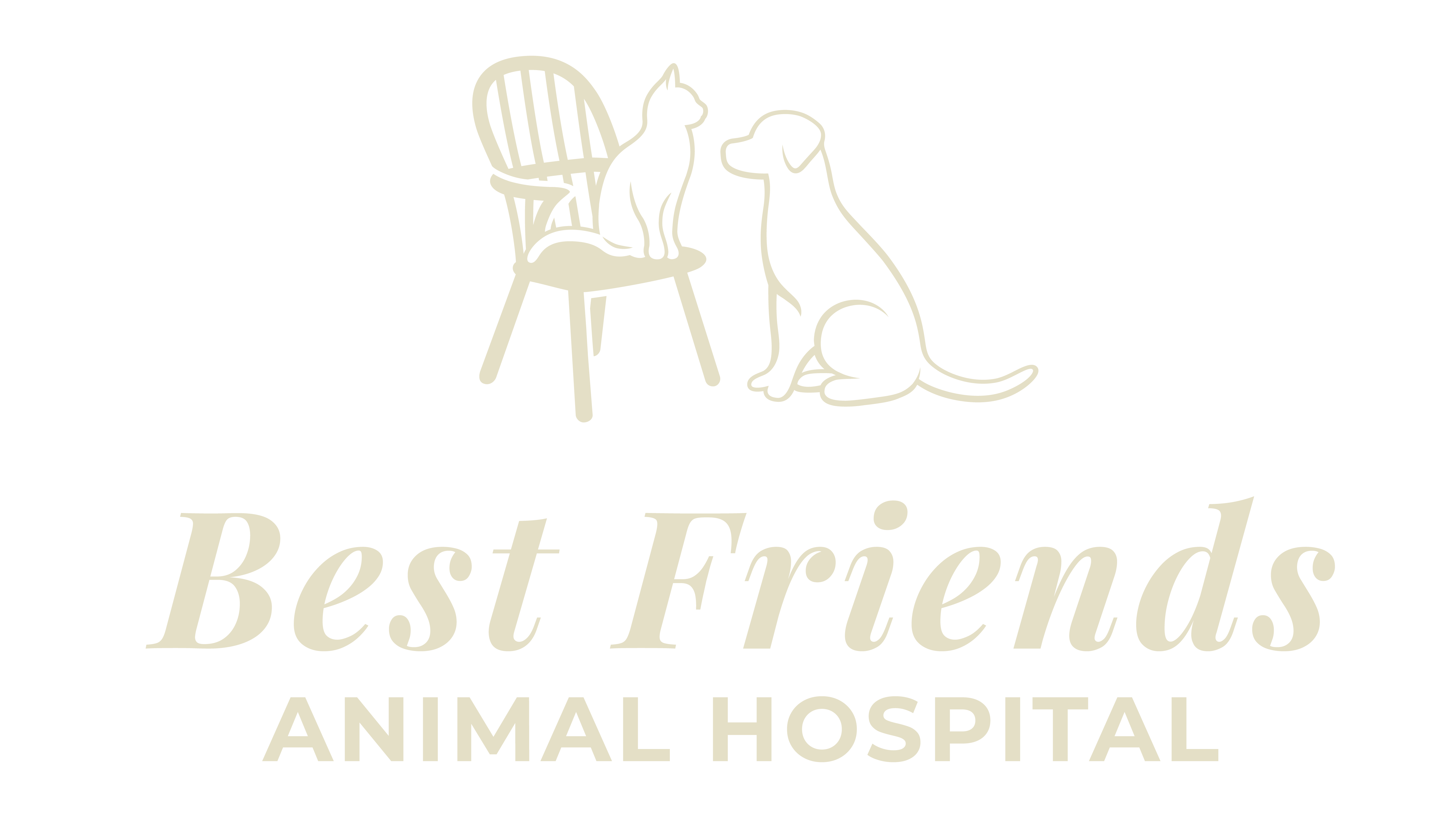Keeping your dog’s vaccinations up to date is one of the most important things you can do for their long-term health. This blog will explain why following a regular vaccination schedule matters and how it helps protect your pet from diseases. If you need more information about your dog’s vaccinations, we encourage you to contact Best Friends Animal Hospital at (603) 625-2378 or schedule an appointment with our team.
How Vaccinations Protect Your Dog
Vaccinations work by helping your dog’s immune system prepare for harmful diseases before they are exposed to them. When a dog gets a vaccine, a small amount of the virus or bacteria is introduced to their body in a safe way. This helps their immune system learn to fight the disease without your pet getting sick. By keeping up with your dog’s vaccinations schedule, you are helping their body stay prepared to handle these threats.
Some of the most common diseases that dog vaccines protect against include rabies, parvovirus, distemper, and kennel cough. These illnesses can range from mild to life-threatening, and in some cases, they can spread to other dogs or even people. Staying on track with vaccinations is a simple way to keep your pet healthy and prevent the spread of disease in your community.
Core Vaccines for Dogs
There are certain vaccines that nearly every dog needs. These are often called “core vaccines,” and they cover the most serious diseases that can affect dogs. Core vaccines include:
- Rabies: Rabies is a fatal disease that affects both dogs and humans. Most states, including New Hampshire, require dogs to be vaccinated against rabies by law.
- Canine Parvovirus: Parvovirus is a highly contagious disease that attacks a dog’s intestines, causing severe vomiting and diarrhea. This illness can be deadly, especially in puppies.
- Canine Distemper: This viral disease affects a dog’s respiratory, gastrointestinal, and nervous systems. It can be fatal, and dogs can pick it up from wildlife or other infected dogs.
- Adenovirus (Hepatitis): This disease can lead to liver damage and other serious health problems in dogs.
By staying current with these core vaccines, you are helping protect your dog from some of the most dangerous diseases they could encounter.
Non-Core Vaccines Based on Your Dog’s Lifestyle
In addition to core vaccines, there are non-core vaccines that may be recommended based on your dog’s lifestyle. These vaccines aren’t required for every dog but may be important if your pet is at risk of exposure to certain diseases. For example:
- Bordetella (Kennel Cough): This vaccine is often recommended for dogs that spend time in boarding facilities, doggy daycares, or grooming salons where they are exposed to other dogs.
- Lyme Disease: If you live in an area with a lot of ticks or your dog spends time outdoors, a Lyme disease vaccine may be a good idea.
- Leptospirosis: Dogs that have access to wildlife or bodies of water might be at risk for leptospirosis, a bacterial disease that can also spread to humans.
Our team at Best Friends Animal Hospital can help you decide which non-core vaccines might be a good fit for your dog, based on their lifestyle and health needs.
Staying on Schedule with Puppy Vaccinations
Puppies need vaccinations early in life to help protect them from diseases while their immune systems are still developing. Typically, puppies begin receiving vaccinations when they are about six to eight weeks old and continue with booster shots every few weeks until they are about four months old.
During this time, your puppy will receive core vaccines, including distemper, parvovirus, and rabies, along with any recommended non-core vaccines. Sticking to this schedule is key to giving your puppy the protection they need during their most vulnerable months.
Once your puppy has received their initial round of vaccinations, they will need booster shots periodically throughout their life to maintain immunity. Our team can help you set up a vaccination schedule that works for your dog, ensuring they stay protected from preventable diseases.
The Risks of Skipping or Delaying Vaccinations
Missing or delaying vaccinations can put your dog at risk for serious illness. When vaccinations are not kept up to date, your dog’s immunity to certain diseases can weaken, leaving them vulnerable to infection. For example, if your dog’s rabies vaccine expires, they are no longer protected against this deadly virus, which can be passed from wildlife or other animals.
Skipping vaccines also puts other pets and people at risk. Diseases like kennel cough and parvovirus can spread easily among dogs in public places like parks, boarding facilities, and daycares. Vaccinating your dog helps prevent these illnesses from spreading to other pets in the community.
If you’ve fallen behind on your dog’s vaccination schedule, we can help get them back on track. Contact us today at Best Friends Animal Hospital to discuss your pet’s health and create a plan for their vaccinations.
Keeping Older Dogs Vaccinated
As dogs age, their immune systems can weaken, making them more susceptible to diseases. Even if your dog is a senior, it’s still important to keep up with their vaccinations. Some older dogs may need fewer non-core vaccines depending on their lifestyle, but core vaccines like rabies and distemper are still necessary.
Older dogs may also benefit from more frequent check-ups to monitor their health and ensure they stay protected from preventable illnesses. Our team at Best Friends Animal Hospital can help you adjust your senior dog’s vaccination schedule based on their individual needs.
Vaccination Safety and Side Effects
Vaccines are an important part of keeping your dog healthy, but like any medical treatment, they can come with some side effects. Most dogs handle vaccines well, but some may experience mild symptoms like soreness at the injection site, a low-grade fever, or mild fatigue for a day or two after getting vaccinated.
Serious side effects are rare but can include allergic reactions, which may show up as swelling, difficulty breathing, or vomiting shortly after a vaccine. If you notice any unusual symptoms after your dog is vaccinated, contact us right away.
Our veterinary team at Best Friends Animal Hospital takes your dog’s health seriously. We use only safe, effective vaccines and follow best practices to minimize the risk of side effects. We are here to answer any questions you may have about your dog’s vaccination schedule.
Why Regular Vet Visits Matter for Vaccinations
Keeping up with your dog’s vaccinations is easier when you schedule regular visits with our veterinary team. During your dog’s check-ups, we’ll review their vaccination schedule, discuss any updates they might need, and make sure they are protected from the latest strains of disease. Regular visits also allow us to monitor your dog’s overall health and catch any issues early.
If you’re unsure about your dog’s vaccination status, it’s never too late to get started. Contact Best Friends Animal Hospital at (603) 625-2378 to set up an appointment and learn more about keeping your dog’s vaccinations on track.
Call Us to Schedule Your Dog’s Vaccinations
At Best Friends Animal Hospital, we’re here to help you navigate your dog’s vaccination schedule and keep them protected from preventable diseases. Whether your dog is due for their first set of vaccinations or just needs a booster shot, our team is ready to provide the care they need. Call us at (603) 625-2378 to schedule an appointment or to get more information about vaccinations for your dog.





